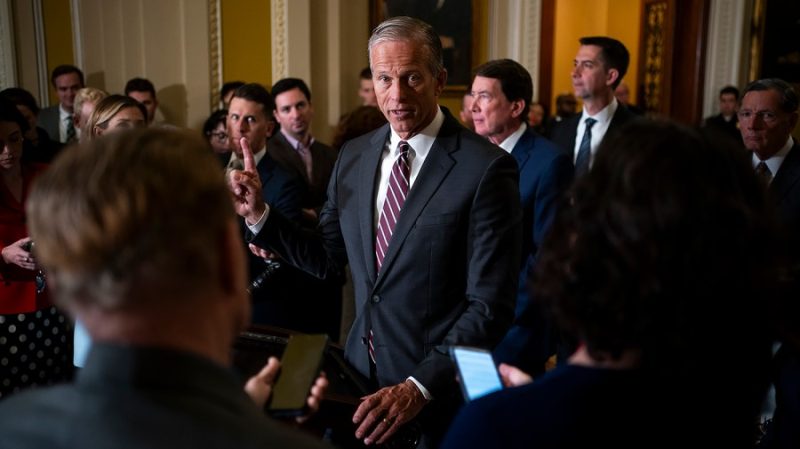Senate Republicans say they’re going to rewrite the 1,116-page bill the House narrowly passed Thursday to enact President Trump’s agenda.
Speaker Mike Johnson (R-La.) urged GOP senators at a meeting Tuesday to keep their changes to the bill as minimal as possible to avoid wrecking the delicate compromises he cobbled together in the House to muster 215 votes for the legislation.
Senate Majority Leader John Thune (R-S.D.), however, told reporters that the Senate will have its “imprint” on the bill, and his GOP colleagues are looking to make changes to an array of provisions.
Here are some of the changes they are eyeing.
Deficit reduction
Senate conservatives led by Sens. Ron Johnson (R-Wis.), Rick Scott (R-Fla.) and Mike Lee (R-Utah) want to include bigger spending cuts in the bill, arguing to colleagues that the legislation, as drafted in the House, will do little to rein in spending.
Ron Johnson isn’t laying out specific cuts but calling for a return to prepandemic levels of federal spending adjusted for inflation and population growth.
“My primary focus now is spending. This is completely unacceptable. Current projections are $2.2 trillion per year deficit,” he said. “There should be a goal of this Republican Senate to reduce the deficit, not increase it. We’re increasing it.”
While House Republicans backed away from making changes to the Federal Medical Assistance Percentage for Medicaid, Johnson and other Senate budget hawks want to address it.
Scott, a close ally of Trump, is calling for a complete repeal of the renewable energy incentives created under then-President Biden in the Inflation Reduction Act.
“We should completely eliminate the Green New Deal,” he said.
Lee is looking at federal benefits going to immigrants lacking permanent legal status, which he said have not been completely zeroed out in the House bill.
Medicaid
Sens. Josh Hawley (R-Mo.), Susan Collins (R-Maine), Lisa Murkowski (R-Alaska) and Jerry Moran (R-Kan.) are threatening to oppose Medicaid reforms that would cut benefits, and they are taking a close look at limits in the bill on states’ ability to use health care provider taxes to collect more federal Medicaid funding.
Their chief concern is that reductions in federal Medicaid funding to states would put pressure on rural hospitals and could force some of them to close.
“We’re still trying to figure out what the provider tax reforms are, but I’m very worried about our rural hospitals in Maine,” Collins told The Hill Wednesday.
Another area of concern is language in the House bill requiring people earning between 100 percent and 138 percent of the federal poverty level to pay up to $35 per medical service.
Hawley says that would mean “beneficiaries pay more.”
“These are working people in particular who are going to have to pay more,” he said.
But other Republicans want to expand the Medicaid reforms to further reduce the program’s costs over the next decade.
Some senators want to further restrict the availability to Medicaid coverage to able-bodied adults.
“Medicaid ought to go back and do what it was set up to do. It was set up to take care of poor children and the chronically ill, and that’s what the focus should be,” Scott said, noting that Florida didn’t expand Medicaid coverage under the Affordable Care Act.
Green energy incentives
Senate Republicans may want to loosen the tough stance the House bill takes on climate-friendly tax credits.
In 2022, the Democrats’ Inflation Reduction Act included billions of dollars in tax credits that supercharged investment in low-carbon energy technologies including wind and solar.
The House version of the bill put tough new restrictions on some of those credits — especially now that for many types of energy they only apply to projects that break ground within 60 days of the bill’s enactment.
Prior to the text’s release, Sens. John Curtis (R-Utah), Thom Tillis (R-N.C.), Murkowski and Moran issued a letter calling for a “targeted, pragmatic approach” and warning against a “full-scale” repeal.
Tillis told The Hill this past week that changes would need to be made to help companies that have already invested in the credits.
“If millions or billions of dollars have been deployed, we’ve got to give those businesses some off-ramp,” he said.
Meanwhile, Sen. Kevin Cramer (R-N.D.) also called for some changes last week, particularly to help emerging technology like geothermal energy.
State and local tax deductions
Speaker Johnson and House Republicans hailing from high-tax blue states held intense talks in recent weeks to nail down a deal on the state and local tax (SALT) deduction cap that helped the chamber clear the bill before Memorial Day.
Much to their chagrin, it’s possible that could all be for nought.
Senate Republicans are widely expected to throw their weight around over how to handle the SALT deduction cap, which Johnson and House SALT Caucus members set at $40,000 for those making $500,000 or less — up from the $10,000 cap that was set by the 2017 Tax Cuts and Jobs Act.
Complicating things for SALT members in the House is there is no similar dynamic across the Capitol. There isn’t a single Senate Republican from any high-tax blue state, leaving many members wanting to chop down what they view as a generous $40,000 figure to something more manageable.
“It’s not a Senate issue,” Thune told The Hill.
“I know the House had to make a deal, but our members want to be heard on it, and I assume we’ll have something to say,” he added.
The cap is set to expire at the end of the year, giving the half-dozen SALT members leverage as they hold the keys to final passage so long as they vote as a bloc.
But Senate Republicans have made it known they expect to have their voices heard on the subject, though they are cognizant of the Speaker’s plight.
“The number we care most about is 218,” said Cramer, a former House member. “Obviously, we’d be open to the Speaker’s desires, just like he’s been open to ours.”
Sunsets
A top priority of Thune and Senate Finance Committee Chair Mike Crapo (R-Idaho) will be to make several high-profile business tax breaks permanent — or at least extend them over the next decade.
The House bill restores 100-percent bonus depreciation for short-term investments from 2025 to 2029.
Similarly, it restores immediate expensing for domestic research and development and the EBITDA-based limit on business interest deductions from 2025 to 2029.
Thune on Thursday flagged that as an issue that Senate Republicans want to change.
He said GOP senators are reviewing “the question of permanence,” noting the House bill has “shorter-term windows” on the corporate tax provisions.
Crapo said the business bonus-depreciation and expensing provisions “need to be permanent.”
Spectrum auction
The House Republican bill would plan for the sale of 600 megahertz of government-owned spectrum to help offset the cost of tax breaks, something that has drawn strong opposition from Sen. Mike Rounds (R-S.D.), a member of the Senate Intelligence Committee, and other defense hawks.
“It has to be taken out or modified,” Rounds said of that House language on spectrum. “That to me is of critical national importance.”
He explained that House negotiators “extended the [spectrum] auction authority until 2034” but only protected the military portions of the spectrum in the first auction sale.
“If they’re going to have auction authority until 2034, the [Department of Defense] portions and the [intelligence community] portions have got to be protected during the time this auction authority exists,” Rounds said.





